Related Research Articles
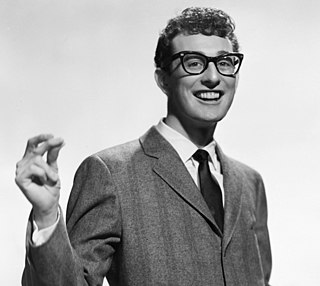
Charles Hardin Holley, known professionally as Buddy Holly, was an American musician and singer-songwriter who was a central and pioneering figure of mid-1950s rock and roll. He was born in Lubbock, Texas, to a musical family during the Great Depression, and learned to play guitar and sing alongside his siblings. His style was influenced by gospel music, country music, and rhythm and blues acts, which he performed in Lubbock with his friends from high school.

The Crickets were an American rock and roll band from Lubbock, Texas, formed by singer-songwriter Buddy Holly in the 1950s. Their first hit record, "That'll Be the Day", released in 1957, peaked at number three on the Billboard Top 100 chart on September 16. The sleeve of their first album, The "Chirping" Crickets, shows the band lineup at the time: Holly on lead vocals and lead guitar, Niki Sullivan on rhythm guitar, Jerry Allison on drums, and Joe B. Mauldin on bass. The Crickets helped set the template for subsequent rock bands, such as the Beatles, with their guitar-bass-drums lineup and the talent to write most of their own material. After Holly's death in 1959 the band continued to tour and record with other band members into the 21st century.

"That'll Be the Day" is a song written by Buddy Holly and Jerry Allison. It was first recorded by Buddy Holly and the Three Tunes in 1956 and was re-recorded in 1957 by Holly and his new band, the Crickets. The 1957 recording achieved widespread success. Holly's producer, Norman Petty, was credited as a co-writer, although he did not contribute to the composition.

"Not Fade Away" is a song credited to Buddy Holly and Norman Petty and first recorded by Holly and his band, the Crickets.
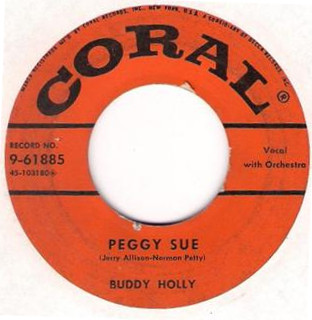
"Peggy Sue" is a rock and roll song written by Jerry Allison and Norman Petty, and recorded and released as a single by Buddy Holly in early July of 1957. The Crickets are not mentioned on label of the single, but band members Joe B. Mauldin and Jerry Allison (drums) played on the recording. This recording was also released on Holly's eponymous 1958 album.

Gunfight At Carnegie Hall is the final album by Phil Ochs released during his lifetime, comprising songs recorded at the infamous, gold-suited, bomb-threat shortened first show at Carnegie Hall in New York City on March 27, 1970, though it contains less than half of the actual concert. The shows recorded that day served to surprise Ochs' fans, from his gold lamé Nudie suit, modeled after Elvis Presley's, to his covers of Presley, Conway Twitty, Buddy Holly and Merle Haggard songs, to his own re-arranged songs. Some fans loved it, but some attendees at the show were unhappy with the music he was playing, wanting only to hear "old" Ochs. Before he had a chance to convince them, the concert was cut short by a telephoned bomb threat. Some angry fans who had paid for a full concert confronted Phil at dinner between shows. He took their names, promising to get them into the second show for free, but the box office was locked and Ochs smashed the glass, severely cutting his thumb. He appeared onstage at the second show with a bandaged hand, telling the audience the story. Breaking into the lockbox was the last straw. While they let Ochs perform the second show, he was banned immediately afterwards from performing again at the venue.

Norman Petty was an American musician and record producer who is best known for his association with Buddy Holly and the Crickets, who recorded in his studio.
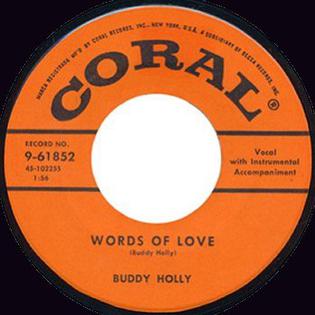
"Words of Love" is a song written by Buddy Holly.
Sonny Curtis is an American singer and songwriter. Most of his work falls into the pop and country genres. He was a teenage friend and band member with Buddy Holly in Lubbock, Texas.
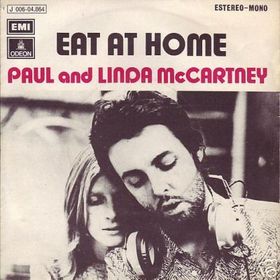
"Eat at Home" is a 1971 single by Paul and Linda McCartney that also appeared on their album Ram from the same year. The song, a standard rock number, features McCartney on lead vocals, electric guitar, bass and drums and Linda McCartney performing backing vocals.

Buddy Holly recorded under several names and with several different backing bands. The Crickets played on almost all of his singles in 1957 and 1958.
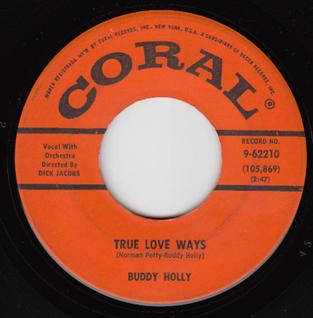
"True Love Ways" is a song attributed to Norman Petty and Buddy Holly, and recorded with the Dick Jacobs Orchestra in October 1958, four months before the singer's death. It was first released on the posthumous album The Buddy Holly Story, Vol. 2, in March 1960. The song was a hit in Britain in 1960, reaching number 25 on the pop singles chart. In an 1988 re-release of the recording by MCA, the single reached no. 65 on the UK singles chart in a 5 week chart run.

"I'm Gonna Love You Too" is a song written by Joe B. Mauldin, Niki Sullivan and Norman Petty, originally recorded by Buddy Holly in 1957. It was recorded 20 years later by American new wave band Blondie and released as the lead single in the U.S. from their multi-platinum 1978 album Parallel Lines.

The Buddy Holly Story is the first posthumously released compilation album by Buddy Holly and the Crickets. The album was released on February 28, 1959 by the Coral Records less than a month after Holly's death.

"Crying, Waiting, Hoping" is a song written by Buddy Holly. It was released in 1959 as the B-side to "Peggy Sue Got Married". Three versions of Holly's recording were released: the 1959 commercial release, the 1964 reissue with different orchestration, and Holly's original, private home recording.

Joseph "Sonny" West is an American songwriter and musician, best known as the co-writer of two of Buddy Holly's biggest hits: "Oh, Boy!" and "Rave On".
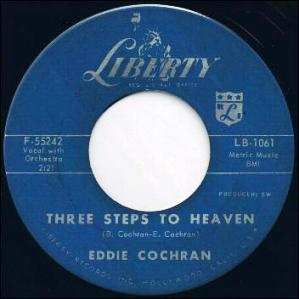
"Three Steps to Heaven" is a song co-written and recorded by Eddie Cochran, released in 1960. The record became a posthumous UK number-one hit for Cochran following his death in a car accident in April 1960. In the US it did not reach the Billboard Hot 100.

In Style With the Crickets is an influential rock and roll album by the Crickets. Although it was the band's first release following the departure and subsequent death of their front man, Buddy Holly, it still contains many of the band's most memorable songs and many tracks have also been featured on numerous compilations over the years. Originally released as an LP record on December 5, 1960, the album remained out of print for some time until it was re-released on CD in 1993, with bonus tracks not featured on the original album.

"It's So Easy!" is a rock-and-roll song written by Buddy Holly and Norman Petty. It was originally released as a single in 1958 by the Crickets but failed to chart. It was the final release by the Crickets when Holly was still in the band.

"When You Ask About Love" is a song written by Jerry Allison and Sonny Curtis and recorded by the Crickets in 1959. It was a hit in the UK, reaching number 27 in the Singles Charts.
References
- ↑ "Buddy Holly - Learning The Game". Discogs. Retrieved 2020-02-22.
- ↑ "Learning the Game - Buddy Holly | Song Info". AllMusic. Retrieved 2020-02-22.
- ↑ "Cover versions of Learning the Game by Buddy Holly | SecondHandSongs". secondhandsongs.com. Retrieved 2020-02-22.
- ↑ "Buddy Holly At 75: A Tribute To An Unlikely Star". NPR.org. Retrieved 2020-02-22.